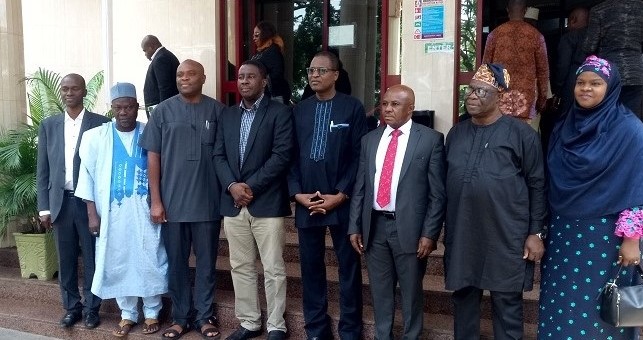The University of Nigeria, Nsukka (UNN) in Enugu State has constituted an 11-man Policy Advisory Panel (PAP) to facilitate the implementation of relevant environment and development policies in the country.

Prof. Charles Igwe, Vice-Chancellor, UNN, at the Resource and Environmental Policy Research Centre (REPRC) Environment for Development (EfD) policy day in Abuja on Thursday, October 17, 2019 said the environment needed proper management to avert disasters.
Members of the PAP include: Prof Olukayode Oladipo of the University of Lagos, Akoka (chairman); Prof. Chinedum Nwajuiba, Vice-Chancellor, Alex Ekwueme Federal University, Ndufu-Alike Ikwo, Abakaliki, Ebonyi State; Dr Peter Tarfa, Director, Department of Climate Change, Federal Ministry of Environment; Hussain Raha, President, National Association of Fish Farmers & Aquaculture; Muyiwa Odele of the United Nations Development Programme (UNDP); Joseph Akpokoye of the World Bank; Mrs Halima Bawa of the Department of Climate Change; Dr Nnaemeka Chukwuone, Director of REPC; Chairman, House Committee on Environment; and Permanent Secretary, Federal Ministry of Agriculture.
Igwe, who was represented by Prof. Pat Okpoko, Deputy Vice-Chancellor, Administration, UNN, said the environment needed to be run in a manner that the generation coming behind would benefit.
According to him, the university believes that things should be done properly to ensure policy effectiveness for sustainable development.
“For us to move the nation forward the environment must be sustainable and so PAP will interface with issues that have to do with policy development and research initiative.
“We, therefore, want to encourage the panel that UNN will support their initiatives and by so doing the Federal Government can apply the policy initiative to solving our environmental challenges,” he said.
The Minister of Environment, Mr Muhammad Mahmood, pledged the ministry’s collaboration with the research institute on all aspects of research that would positively impact the country.
Mahmood, who was represented by Dr Tarfa, said the issues of environmental challenges cut across many aspects of our livelihood which required synergy with experts.
“We want to see how we will use the available natural resources to tackle environmental challenges facing the country.
“The ministry welcomes the synergy and the door is open for collaboration and value addition to tackle the environmental challenges.
“The terms of reference of panel include to definitely guiding the focus of the research to be in tandem with national priorities.
“The focus of government for instance on flooding can be solved through collaboration to control and solve the problems in the country.
“Also, the climate change challenge is the number one environmental challenge which must be solved.”
The minister however, said that to generate plants and trees that are resilient to the impact of climate change could only be done through research.
He, therefore, promised to support the research centre to undertake focused research.
Dr Nnaemeka Chukwuone, REPRC-EfD said the aim of the centre was to advance research, capacity building and policy advocacy.
Chukwuone noted that the panel was created as a forum for agenda setting in critical resource and environmental policy issues in the country.
According to him, the panel will look into fishing management in the country which is one of the reasons the panel was set up.
“The aim is to advance the way fishery is managed in Nigeria and to proffer solutions to go about it.
“There are lots of problems, so today, policy makers will discuss the problem based on the research output we are presenting and then discuss how to improve fishing management in Nigeria.
“We will also discuss other areas like the climate change which are in different areas of agricultural research,” he added.
Prof. Oladipo, Chairman of the panel, said the centre recognised the need to advance policy advisory interface in the country of which research output were used to advise policy and translate them into development.
Oladipo pledged to work as a team to guide the policies of some of the research which could ensure that it translate into development thereby helping the government to take certain decisions.
“A number of times, the policies are not implemented so what we are interested is not a bulky policy document, but two or three pages advise that will be worked on ans used for policy decision making.”
The centre, which is domicile at the university, was established to advance interdisciplinary research, capacity building and policy advocacy on the different dimensions of environmental and resource economics.
Its objective is to support poverty alleviation and sustainable development by building environmental economics capacity in the policy making processes.
